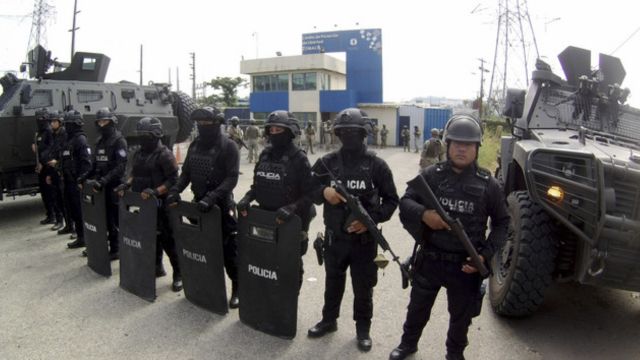The decision of Ecuador’s government to forcibly enter the Mexican Embassy has sparked widespread global condemnation. Leaders and presidents alike are expressing their disapproval, shock, and dismay at this action.
Mexico’s ambassador and other personnel arrived in Mexico City on Sunday afternoon after departing Ecuador’s capital, Quito, on a commercial flight. The criticism followed President Andrés Manuel López Obrador’s decision to sever diplomatic ties with Ecuador in response to Friday’s raid. This action has been widely condemned by international law experts, presidents, and diplomats who consider it a violation of long-established international accords.
Mexico’s secretary of foreign relations, Alicia Bárcena, expressed her gratitude to the returning diplomats for their unwavering dedication in safeguarding our embassy in Quito, even at the peril of their own physical safety.
She condemned the violent entry into the Mexican embassy in Chile, stating that not even the dictator Pinochet had dared to do so. The intruders entered without authorization and physically assaulted diplomats, which she strongly denounced.
In a dramatic turn of events, Jorge Glas, the former vice president who had sought asylum at the embassy since December, was apprehended by the police. They forcefully entered the embassy premises to arrest him, as he had been indicted on corruption charges.
Mexico intends to challenge the raid on Monday at the World Court in The Hague, according to Bárcena. She further stated that Mexico has received support from 18 Latin American countries, 20 European countries, and the Organization of American States.
In a statement released on Sunday, the Spanish foreign ministry expressed its concern over the forceful entry into the Embassy of Mexico in Quito. The ministry emphasized the importance of respecting international law and fostering harmony between Mexico and Ecuador, both of which are regarded as brotherly countries to Spain and members of the Ibero-American community. The ministry further highlighted that this incident constitutes a violation of the 1961 Vienna Convention on Diplomatic Relations.
The OAS issued a statement reminding its members, including Ecuador and Mexico, of their responsibility to uphold their international obligations and not use domestic laws as a justification for non-compliance.
According to Matthew Miller, spokesperson for the U.S. State Department, the United States strongly condemns any breach of the Vienna Convention on Diplomatic Relations. Miller emphasized the importance of host countries adhering to international law and respecting the sanctity of diplomatic missions. He urged the two nations involved to find a peaceful resolution to their disagreements.
Diplomatic premises enjoy the status of foreign soil and are deemed “inviolable” according to the Vienna treaties. As per the law, host country law enforcement agencies are prohibited from entering these premises without the ambassador’s permission. This unique arrangement has allowed individuals seeking asylum to find refuge within embassy walls. From a few days to several years, people have sought shelter in embassies worldwide, including the Ecuadorian embassy in London. Notably, this embassy served as the residence for WikiLeaks founder Julian Assange for seven years, shielding him from arrest by British police.
On Saturday, Glas was transferred from the attorney general’s office in Quito to a maximum-security prison in the port city of Guayaquil.
According to Vera, the defense team has not had the opportunity to communicate with Glas since his arrest.
Authorities are currently conducting an investigation into Glas regarding alleged irregularities that occurred during his tenure overseeing the reconstruction efforts after a devastating earthquake in 2016, which resulted in the loss of numerous lives. Prior to this investigation, Glas had already been convicted in two separate cases involving bribery and corruption.
President Daniel Noboa has not yet addressed the raid publicly as of Sunday. However, Ecuador’s Foreign Minister Gabriela Sommerfeld informed the media on Saturday that the decision to enter the embassy was made by Noboa himself. This decision was made after taking into account Glas’ “imminent flight risk” and after all diplomatic dialogue options with Mexico had been exhausted.
Mexico granted asylum to Glas just hours before the raid. According to Sommerfeld, this action raises questions about the legality of granting asylum to individuals convicted of common crimes by competent courts.
Noboa assumed office as Ecuador’s president last year amidst a surge in crime related to drug trafficking. In response to this pressing issue, he declared the country to be in an “internal armed conflict” in January. As part of his measures to combat this problem, he identified 20 drug-trafficking gangs as terrorist groups. The military was given the authority to “neutralize” these groups, while adhering to the principles of international humanitarian law.
Noboa’s term will come to an end in 2025, as he was elected to complete the remaining term of former President Guillermo Lasso.
According to María Dolores Miño, director of Ecuador’s independent Law and Justice Observatory and a law professor at the International University of Ecuador, the recent raid not only brings great embarrassment to Ecuador but also raises concerns about potential serious consequences.
Miño emphasized the significance of recognizing the extent of a political sanction and its consequences. She stressed that while the legal process that Mexico will undertake before the World Court may be time-consuming, there will eventually be a verdict that entails economic reparations, which will need to be financed by the people of Ecuador.

